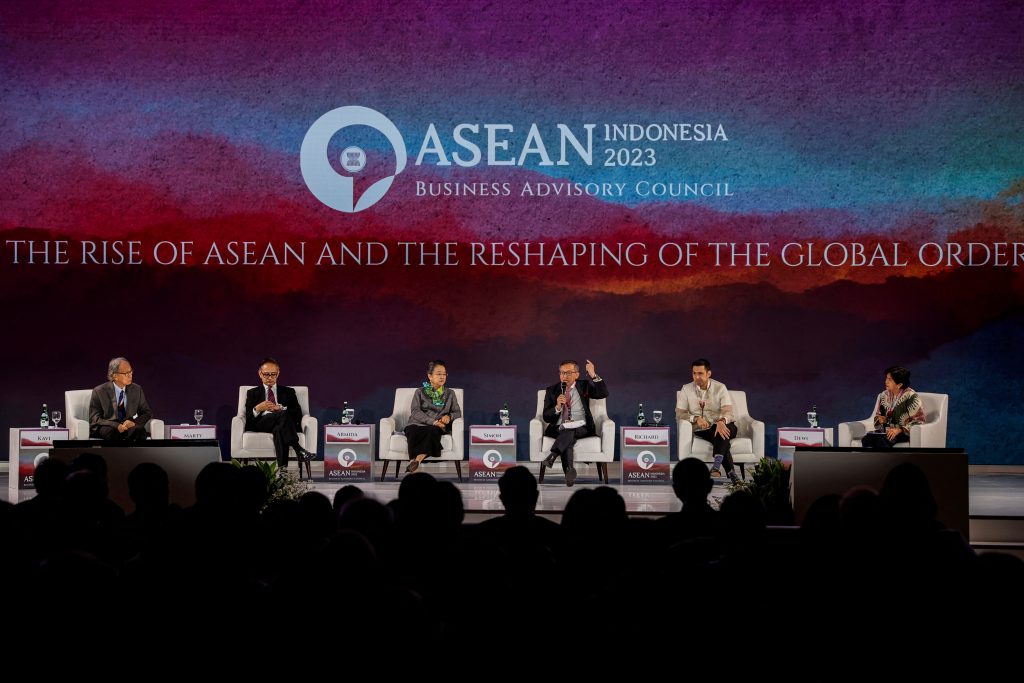The post-pandemic landscape has seen increased deglobalisation of the multilateral trading system and a greater emphasis on regional development. The mantra of low-cost, ‘just in time’ supply chain dynamics has morphed into ‘just in case’, with efforts aimed at resilience through nearshoring, friend-shoring and onshoring.
The Association of Southeast Asian Nations (ASEAN) is coming out of the other side of this shift as an economic growth engine and a top recipient of foreign direct investment (FDI). FDI inflows increased from a pre-pandemic annual average of 7 per cent from 2011 to 2017 to 12 per cent from 2020 to 2021. In 2021, inflows of FDI into the ASEAN region increased by 42 per cent to US$174 billion. In 2022, FDI inflows into ASEAN reached US$224 billion. Singapore was the leading destination for greenfield FDI within ASEAN. The net inflow for FDI is projected to be US$27.47 billion in 2023 and US$20.18 billion in 2024.
The US–China trade and tech rivalry has made ASEAN the world’s fifth-largest economic region a trade ’battleground’ as both powers compete for economic influence there. The United States is ASEAN’s largest foreign investor, pouring US$40.2 billion — 22.5 per cent of total FDI — into ASEAN. China’s investment flows also increased to US$18.7 billion in 2022, or 7 per cent of total net FDI into ASEAN. This established ASEAN as China’s second-largest overseas direct investment destination.
China’s global outward FDI focus has also changed within ASEAN, from Belt and Road infrastructure investment to essential manufacturing hubs. Compelled by trade conflicts with the United States, Chinese firms have relocated parts of their manufacturing operations to ASEAN countries to circumvent US tariffs.
FDI will remain critical for ASEAN and may become a source of political conflict among its trading partners. One approach to avoid potential friction is to employ screening measures of foreign investments in strategic industries, as practiced by the United States and the European Union but not as much by ASEAN countries.
A screening framework for FDI would enhance transparency and confidence among foreign investors. Singapore proposed its own Significant Investments Review Bill (SIRB) to safeguard its national interests in strategic industries. The SIRB was passed in Singapore’s parliament on 9 January 2024.
Singapore was motivated to introduce the SIRB because of three shifts in the global economy. First, alliances are being reorganised as countries seek new trade partnerships and investment flows are concentrated among countries that are geopolitically aligned. Second, global supply chains are being reorganised to reduce risks. Third, economic imperatives are increasingly being weighed against national security interests.
With tens of thousands of international and multinational companies based in Singapore, the government must strengthen the city-state’s relevance as a business hub and continue to support a rules-based trading order in a way that reinforces multilateral trading institutions.
The COVID-19 pandemic also showed how Singapore can be impacted by challenges to the multilateral trading order. During the pandemic, former US President Donald Trump invoked national defence legislation to force multinational company 3M to export masks to the United States from Singapore. 3M resisted this demand, but the episode demonstrated to Singaporean authorities the benefits of controlling mask-making as well as the broader biomedical sector.
Another key sector is electronics. The Singapore government is enhancing its capabilities for the digital economy and building resilience in its supply chains. Access to critical items such as microchips is crucial and may be covered by the SIRB.
It was reported that 15 per cent — US$2.7 billion — of US artificial intelligence computing company Nvidia’s third quarter revenue came from Singapore. This was probably due to the numerous data centres and cloud service providers that form Singapore’s digital infrastructure.
As the ASEAN region emulates Singapore’s lead in economic transformation for the digital age, the SIRB could be a useful tool to discern the sources and impact of FDI inflows based on security and national interests. But unlike fully developed regions, ASEAN countries may need to prioritise development needs over added scrutiny of foreign investments through policy tools like the SIBR.
Among the key features of the SIRB are that buyers acquiring designated entities must notify the Minister for Trade and Industry (MTI) if they become a 5 per cent controller in the entity and seek approval before acquiring 12 per cent or more of the entity. Buyers must also seek approval before becoming indirect controllers. Designated entities must seek approval for the appointment of key personnel. The MTI also has the power to review transactions within a two-year period of entities that acted against Singapore’s national security interests.
Policy tools like the SIRB must be carefully calibrated to prevent a shift from Singapore’s business and investment-friendly approach. Close consultation with affected business entities is essential once the SIRB thresholds are triggered for foreign investments.
Given that the ASEAN region is likely to benefit from the US–China economic rivalry, SIRB-type legislation would enhance transparency for foreign investors and could mitigate the impact of big power influence over contractual obligations under a rules-based international trading framework.
Faizal Bin Yahya is Senior Research Fellow in the Institute of Policy Studies at the Lee Kuan Yew School of Public Policy, National University of Singapore.


Post-pandemic ASEAN has emerged as a global FDI hotspot, fueled by resilient supply chains and competition between the US and China. But this boom brings potential conflict, and increased scrutiny of foreign investments is needed to manage national security concerns. Singapore's proposed SIRB offers a model for screening foreign investment in critical sectors. Effectively calibrating policies between investment and security will be crucial for Singapore and ASEAN's economic future.